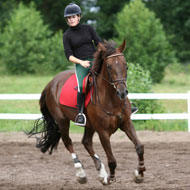
"Many horses with lameness are going unrecognised" study finds
The relationship between saddle slip and lameness in sports horses, has been studied by the Animal Health Trust.
Saddle slip is usually blamed on poor saddle fit, a crooked rider or asymmetry in the shape of the horse’s back but the first phase of a long-term research project, which was first published in 2012, showed that in fact hind limb lameness is frequently the culprit.
Now Dr Sue Dyson, head of clinical orthopaedics at the Centre for Equine Studies at the Animal Health Trust (AHT) and Line Greve, PhD student at the AHT, have looked into the frequency of saddle slip and the reasons for it, in a large cross-section of the sports horse population.
They assessed 506 working sports horses and found that 46 per cent were classified as lame or having a stiff, stilted canter.
Saddle slip occurred in 12 per cent of cases, predominantly in those with hind limb, as opposed to fore limb, lameness. There was minimal asymmetry of back shape in the horses studied but 37 per cent of the riders sat crookedly, possibly as an effect of the saddle slip rather than as a cause.
“Given these figures, horses with hind limb lameness and gait abnormalities are more than 50 times more likely to have saddle slip than other horses,” said Line Greve.
“Furthermore with nearly half of those studied being lame, many horses with lameness are clearly going unrecognised. This study has reinforced our previous work and suggests that further education of riders and trainers is needed, to help them identify saddle slip as an indicator of lameness.”
The full results of the study will be presented at the second Saddle Research Trust International Conference, to be held in Cambridge on November 29 at Anglia Ruskin University.
Advance tickets are £100 but there is a 15 per cent discount if you book by June 1.
Alternatively tickets are £75 for SRT, BEVA, WHW members and students or £150 on the door. Email research@saddleresearchtrust.com or telephone 07775 912202 to book places.
To find out more and to download a copy of the programme visit www.saddleresearchtrust.com



 The Federation of Independent Veterinary Practices (FIVP) has announced a third season of its podcast, Practice Matters.
The Federation of Independent Veterinary Practices (FIVP) has announced a third season of its podcast, Practice Matters.